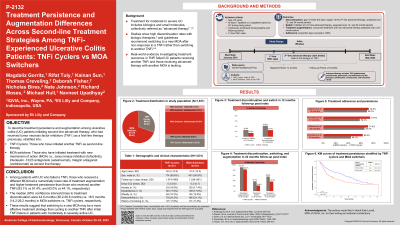Monday Poster Session
Category: IBD
P2132 - Treatment Persistence and Augmentation Differences Across Second-Line Treatment Strategies Among TNFi Experienced Ulcerative Colitis Patients: TNFi Cyclers vs MOA Switchers
Monday, October 23, 2023
10:30 AM - 4:15 PM PT
Location: Exhibit Hall

Has Audio

Navneet Updhyay, MS, PhD
Eli Lilly and Company
Indianapolis, IN
Presenting Author(s)
Magdaliz Gorritz, MPH1, Rifat Tuly, MPH1, Kainan Sun, PhD1, Thomas Creveling, MBA2, Deborah Fischer, MD2, Nicholas Bires, MPH2, Nate Johnson, PharmD2, Richard E. Moses, DO, JD2, Michael Hull, MS1, Navneet Updhyay, MS, PhD2
1IQVIA, Wayne, PA; 2Eli Lilly and Company, Indianapolis, IN
Introduction: Numerous biologics and small molecules are approved for the treatment of moderately to severely active ulcerative colitis (UC). Current clinical practice guidelines suggest switching to a new mechanism of action (MOA) after failing on a tumor necrosis factor inhibitor (TNFi) rather than switching to another TNFi. There is little real-world evidence regarding treatment outcomes in pts with UC receiving another TNFi after failing an initial TNFi (TNFi cyclers) and those who received advanced therapy (AT) with another MOA (MOA switchers).
Methods: This retrospective cohort study identified adult patients (pts) in the IQVIA PharMetrics® Plus database who were diagnosed with UC and switched to a second AT after initial treatment with a TNFi between 01 Jan 2015 and 31 May 2021. Pts had ≥12 months of pre-index and 24 months of post-index continuous enrollment in a health plan and no evidence of other autoimmune diseases. Pts were grouped into cohorts of TNFi cyclers or MOA switchers. Treatment persistence and augmentation were assessed from the start of the second AT until the end of follow-up. Discontinuation was defined as a gap ≥2 times the days’ supply of the second AT or starting a new AT. Augmentation was defined as treatment with non-advanced therapies while on the second AT. Descriptive statistics of outcomes were reported, and Kaplan-Meier method was used to report the time to treatment discontinuation.
Results: Of 1031 pts included in the study, 313 (30.4%) were TNFi cyclers and 718 (69.6%) were MOA switchers (vedolizumab: 78.4%; tofacitinib: 11.1%; ustekinumab: 10.4%). Persistence rates at both 12- and 24-months after second line initiation were higher in MOA switchers than TNFi cyclers (12-month rates: 74.7% vs. 58.2%; 24-month rates: 63.0% vs. 44.1%). The median (95% confidence interval) times to treatment discontinuation were 44.0 (36.2-50.6) vs. 18.5 (14.2-26.2) months in MOA switchers vs. TNFi cyclers, respectively (Figure 1). Furthermore, augmentation was less common in MOA switchers than TNFi cyclers (83.1% vs. 91.4%).
Discussion: Among pts who failed a TNFi, those who received a different MOA had a numerically lower rate of treatment augmentation and higher treatment persistence than those who received another TNFi. These results suggest that switching to a new MOA may be a more effective treatment strategy than cycling to another TNFi after initial TNFi failure in pts with moderately to severely active ulcerative colitis.

Disclosures:
Magdaliz Gorritz, MPH1, Rifat Tuly, MPH1, Kainan Sun, PhD1, Thomas Creveling, MBA2, Deborah Fischer, MD2, Nicholas Bires, MPH2, Nate Johnson, PharmD2, Richard E. Moses, DO, JD2, Michael Hull, MS1, Navneet Updhyay, MS, PhD2. P2132 - Treatment Persistence and Augmentation Differences Across Second-Line Treatment Strategies Among TNFi Experienced Ulcerative Colitis Patients: TNFi Cyclers vs MOA Switchers, ACG 2023 Annual Scientific Meeting Abstracts. Vancouver, BC, Canada: American College of Gastroenterology.
1IQVIA, Wayne, PA; 2Eli Lilly and Company, Indianapolis, IN
Introduction: Numerous biologics and small molecules are approved for the treatment of moderately to severely active ulcerative colitis (UC). Current clinical practice guidelines suggest switching to a new mechanism of action (MOA) after failing on a tumor necrosis factor inhibitor (TNFi) rather than switching to another TNFi. There is little real-world evidence regarding treatment outcomes in pts with UC receiving another TNFi after failing an initial TNFi (TNFi cyclers) and those who received advanced therapy (AT) with another MOA (MOA switchers).
Methods: This retrospective cohort study identified adult patients (pts) in the IQVIA PharMetrics® Plus database who were diagnosed with UC and switched to a second AT after initial treatment with a TNFi between 01 Jan 2015 and 31 May 2021. Pts had ≥12 months of pre-index and 24 months of post-index continuous enrollment in a health plan and no evidence of other autoimmune diseases. Pts were grouped into cohorts of TNFi cyclers or MOA switchers. Treatment persistence and augmentation were assessed from the start of the second AT until the end of follow-up. Discontinuation was defined as a gap ≥2 times the days’ supply of the second AT or starting a new AT. Augmentation was defined as treatment with non-advanced therapies while on the second AT. Descriptive statistics of outcomes were reported, and Kaplan-Meier method was used to report the time to treatment discontinuation.
Results: Of 1031 pts included in the study, 313 (30.4%) were TNFi cyclers and 718 (69.6%) were MOA switchers (vedolizumab: 78.4%; tofacitinib: 11.1%; ustekinumab: 10.4%). Persistence rates at both 12- and 24-months after second line initiation were higher in MOA switchers than TNFi cyclers (12-month rates: 74.7% vs. 58.2%; 24-month rates: 63.0% vs. 44.1%). The median (95% confidence interval) times to treatment discontinuation were 44.0 (36.2-50.6) vs. 18.5 (14.2-26.2) months in MOA switchers vs. TNFi cyclers, respectively (Figure 1). Furthermore, augmentation was less common in MOA switchers than TNFi cyclers (83.1% vs. 91.4%).
Discussion: Among pts who failed a TNFi, those who received a different MOA had a numerically lower rate of treatment augmentation and higher treatment persistence than those who received another TNFi. These results suggest that switching to a new MOA may be a more effective treatment strategy than cycling to another TNFi after initial TNFi failure in pts with moderately to severely active ulcerative colitis.

Figure: Figure 1. Kaplan-Meier curves of the probability of treatment persistence in TNFi-experienced ulcerative colitis pts, stratified by TNFi cyclers and MOA switchers.
Legend: TNFi, Tumor Necrosis Factor inhibitor. MOA switchers, pts who had first-line treatment with a TNFi and second-line treatment with a different mechanism of action. TNFi Cyclers, pts who had first-line treatment with a TNFi and second-line treatment with a different TNFi. Persistence is defined as the presence of a gap of more than 2 times the dose frequency of respective advanced therapy or switching to different advanced therapy.
Legend: TNFi, Tumor Necrosis Factor inhibitor. MOA switchers, pts who had first-line treatment with a TNFi and second-line treatment with a different mechanism of action. TNFi Cyclers, pts who had first-line treatment with a TNFi and second-line treatment with a different TNFi. Persistence is defined as the presence of a gap of more than 2 times the dose frequency of respective advanced therapy or switching to different advanced therapy.
Disclosures:
Magdaliz Gorritz: Eli Lilly and Company – Consultant.
Rifat Tuly: Eli Lilly and Company – Consultant.
Kainan Sun: Eli Lilly and Company – Consultant.
Thomas Creveling: Eli Lilly and Company – Employee, Stock Options.
Deborah Fischer: Eli Lilly and Company – Employee, Stock Options.
Nicholas Bires: Eli Lilly and Company – Employee, Stock Options.
Nate Johnson: Eli Lilly and Company – Employee, Stock Options.
Richard E. Moses: Eli Lilly and Company – Employee, Stock-privately held company.
Michael Hull: Eli Lilly and Company – Consultant.
Navneet Updhyay: Eli Lilly and Company – Employee, Stock Options.
Magdaliz Gorritz, MPH1, Rifat Tuly, MPH1, Kainan Sun, PhD1, Thomas Creveling, MBA2, Deborah Fischer, MD2, Nicholas Bires, MPH2, Nate Johnson, PharmD2, Richard E. Moses, DO, JD2, Michael Hull, MS1, Navneet Updhyay, MS, PhD2. P2132 - Treatment Persistence and Augmentation Differences Across Second-Line Treatment Strategies Among TNFi Experienced Ulcerative Colitis Patients: TNFi Cyclers vs MOA Switchers, ACG 2023 Annual Scientific Meeting Abstracts. Vancouver, BC, Canada: American College of Gastroenterology.
